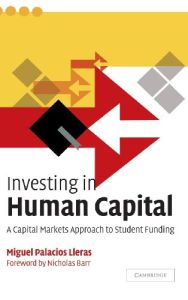Join getAbstract to access the summary!

Join getAbstract to access the summary!
Miguel Palacios Lleras
Investing in Human Capital
A Capital Markets Approach to Student Funding
Cambridge UP, 2004
What's inside?
Society needs new ways to fund college, but will students commit a percentage of future earnings to pay today’s tuition?
Recommendation
Author Miguel Palacios Lleras dedicates his book, "To those whose financial situation does not allow them to develop their full potential." Then he offers several creative proposals to make it easier for students to obtain financing for higher education. At first blush, his concept of paying for an education loan by signing away part of future earnings sounds like a modern-day form of indentured servitude. But with tuition skyrocketing and knowledge becoming more central to every facet of society, including worthwhile employment, alternative methods of financing are increasingly necessary. Perhaps this book, with its rather daring notions of human capital contracts and capital options, has some answers. Much of it is dedicated to a fundamentally sound analysis of the cost-benefit economics of education and the risk management measures required to make these ideas a reality. While it is not exactly a book you would read at the beach, getAbstract.com strongly recommends this to academic counselors, loan officers, administrators and government officials who fight daily battles to foster a more educated workforce.
Summary
About the Author
Miguel Palacios Lleras is co-founder of Lumni, a firm that manages human capital funds. He is a fellow at the University of Virginia Darden School of Business Administration’s Batten Institute and he has written numerous papers on the business of financing human capital.
















Comment on this summary